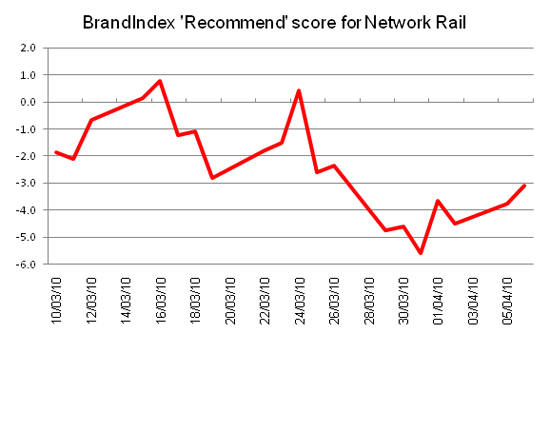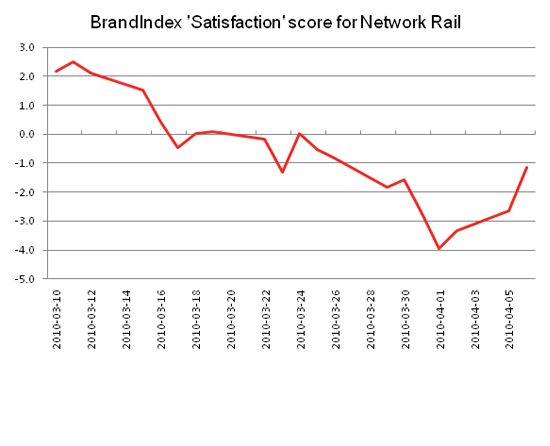Threats of rail strikes have hovered like a dark cloud over millions of British commuters in recent weeks and BrandIndex has the figures to prove it.
The strike, which was announced by the Rail Maritime and Transport (RMT) union on the 25th March, which would be the biggest of its kind in 16 years, had been set for the Tuesday following the bank holiday weekend, understandably irking many commuters. On Tell YouGov, one deflated ‘tygger’, lamented Trade Unions, saying: ‘more strikes to make life difficult for me’. Another retorted that the strikes ‘are bad for the country’. The Prime Minister seems to agree; he claimed that the strikes in the air and on the rails could cost him the election and said that a national rail strike was ‘in nobody’s interest’.
However, the RMT’s general secretary, Bob Crow, was insistent that the strike was about issues that affected everyone. He claimed that ‘these issues aren’t about extra money [or] about achieving better paying conditions - which all might be acceptable reasons to have disputes in the future - this is about the safety of the railway network.’
Unfortunately for Network Rail, the owners of Britain’s rail infrastructure, the planned walkout by thousands of maintenance workers, box signallers and supervisors, has badly affected its BrandIndex standing. While the company usually records negative scores in general, the recent wave of news has sent its measures into freefall. And despite Network Rail’s successful bid to the High Court to have the strike blocked - citing irregularities in the balloting process - recovery remains slow.
As we can see, the 26th March (the day following the RMT’s announcement) coincides with a marked decrease in Network Rail’s index score (the average of the seven different BrandIndex measures put together). If we look at the ‘Reputation’ score, measured by asking if respondents would be proud, or embarrassed, to work for the company, we see that on the 26th March, there was a significant fall in the company’s reputation score, from -8.9 to -13.4, a loss of 4.5 points in just three days.
Other measures haemorrhaging points are the ‘Satisfaction’ and ‘Recommend’ measures. Satisfaction, measured by asking people if they were satisfied with the brand, witnessed a drop of -1 point from -0.8 to -1.8, from the 26th- 29th and by the 1st April, public satisfaction had fallen to -3.7 points. The ‘Recommend’ score, measured by asking whether respondents would recommend the brand to other, fared no better, losing a massive 3.47 points over the same period. It did, however, see a promising points hike between the 31st and the 1st: from -5.6 to -3.7. Both measures however, are currently on the up, a possible response to the High Court Injunction.
Both Network Rail and National Rail’s ‘Buzz’ score has been adversely affected since the announcement of strike action, which, given that the strike was actually called by RMT, may point to a lack of public understanding about the mechanics of the strike – although it is fair to say that some may feel that RMT’s grievances are justified.
It is debatable whether the injunction will be the light at the end of the tunnel that Network Rail was looking for, as after the announcement of the injunction Mr Crow commented: ‘This judgement is an attack on the whole trade union movement...our executives will meet this evening with a recommendation for a re-ballot’. With this in mind, a successful re-ballot by RMT will almost certainly ensure continued negative press and BrandIndex measures for Network Rail, despite it having no control over whether there is a strike action or not.









